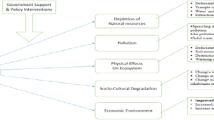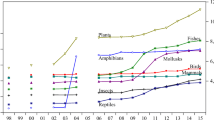Abstract
As major tourism economies in the Southern Mediterranean, Greece, Spain, and Turkey are particularly vulnerable to climate change. With mounting evidence of climate change, we study if the negative impact of climate change on Greece, Spain, and Turkey is particularly large. Empirically, we use a unique data set that makes temperature measurement more meaningful, and adopt the model in Ng and Zhao (Ecological Economics 70:963–970, 2011) to estimate the economic impacts of climate change on different types of economies. Our main finding is that climate change’s adverse impact on Greece, Spain, and Turkey is larger than its impacts on other types of economies, suggesting that Greece, Spain, and Turkey should engage in strong international cooperation to mitigate the adverse impact of climate change.






Similar content being viewed by others
Notes
The Leaders’ Declaration from the annual meeting of the G20 world leaders, in 2013, recognizes "the role of travel and tourism as a vehicle for job creation, economic growth and development” and commits to “work towards developing travel facilitation initiatives in support of job creation, quality work, poverty reduction and global growth.” (See the press release of the World Tourism Organization at http://media.unwto.org/en/press-release/2012-06-20/g20-recognizes-travel-tourism-driver-economic-growth-first-time-and-commits).
The G-Econ cell is approximately 100 km by 100 km, which is generally smaller than the size of the major subnational political entities for most large countries (e.g., states in the United States) and approximately the same size as the second level political entities in most countries (e.g., counties in the United States).
As a special case of quantile regression, at the 0.5 quantile (or 50 percentile), the median regression also serves as a robust (to outliers) alternative to the least-squares regression.
Based on Eq. (1), at the initial temperature (T 0i ), the fitted value of log output per capita is: \(\log_{e} (\hat{y}_{0i} ) = \phi d_{i} + \hat{a}_{1} T_{0i} + \hat{a}_{2} T_{01}^{2} + \hat{a}_{3} T_{0i}^{3} + b\log (P_{i} )\)
Holding other relevant variables (e.g., population) constant, at the new temperature (T 1i ), the fitted value of log output per capita is:
\(\log_{e} (\hat{y}_{1i} ) = \phi d_{i} + \hat{a}_{1} T_{1i} + \hat{a}_{2} T_{1i}^{2} + \hat{a}_{3} T_{1i}^{3} + b\log (P_{i} )\)
The change in log output per capita is then:
\(\log_{e} (\hat{y}_{1i} ) - \log_{e} (\hat{y}_{0i} ) = \log_{e} (\frac{{\hat{y}_{1i} }}{{\hat{y}_{0i} }}) = \hat{a}_{1} (T_{1i} - T_{0i} ) + \hat{a}_{2} (T_{1i}^{2} - T_{0i}^{2} ) + \hat{a}_{3} (T_{1i}^{3} - T_{0i}^{3} )\)
We drop the logs and subtract both sides by 1 to obtain
\(\frac{{\hat{y}_{1i} }}{{\hat{y}_{0i} }} - 1 = e^{{\hat{a}_{1} \Delta T_{i} + \hat{a}_{2} (T_{1i}^{2} - T_{0i}^{2} ) + \hat{a}_{3} (T_{1i}^{3} - T_{0i}^{3} )}} - 1\)
which leads to \(\Delta \hat{y}_{i} = \hat{y}_{i} \left[ {e^{{\tilde{\alpha }_{1} \Delta T + \hat{\alpha }_{2} (T_{1i}^{2} - T_{0i}^{2} ) + \hat{\alpha }_{3} (T_{1i}^{3} - T_{0i}^{3} )}} - 1} \right]\).
Russia,Czech Republic, Poland, Chile, Hungary, South Korea, Turkey, China, Peru, Mexico, Morocco, South Africa, Brazil, Egypt, Colombia, Indonesia, India, Malaysia, Philippines and Thailand.
References
Acemoglu D, Johnson S, Robinson J (2001) The colonial origins of comparative development: an empirical investigation. Am Econ Rev 91:1369–1401
Agassiz L (1840) Etudes sur les Glaciers, (Studies on Glaciers, 1967, translated and edited by A. V. Carozzi). Hafner Publishing Company, New York
Agnew M, Viner D (2001) Potential impact of climate change on international tourism. Tour Hosp Res 3:37–60
Amelung B, Viner D (2006) Mediterranean tourism: exploring the future with the tourism climatic index. J Sustain Tour 14:349–366
Amelung B, Nicholls S, Viner D (2007) Implications of global climate change for tourism flows and seasonality. J Travel Res 45:285–296
Arrhenius S (1896) On the influence of carbonic acid in the air upon the temperature of the ground. Philos Mag J Sci 41(5):237–276
Balaguer J, Cantavella-Jorda M (2002) Tourism as a long-run economic growth factor: the Spanish case. Appl Econ 34:877–884
Becken S (2005) Harmonizing climate change adaptation and mitigation: the case of tourist resorts in Fiji. Glob Environ Chang 15:381–393
Belle N, Bramwell B (2005) Climate change and small island tourism: policy maker and industry perspectives in barbados. J Travel Res 44:32–41
Bigano A, Hamilton JM, Lau M, Tol RSJ, Zhou Y (2007) A global database of domestic and international tourist numbers at national and subnational level. Int J Tour Res 9:147–174
Brida Juan Gabriel, Lanzilotta Bibiana, Lionetti Stefania, Risso Wiston Adrián (2010) The tourism-led growth hypothesis for Uruguay. Tour Econ 16:765–771
Callender GS (1938) The artificial production of carbon dioxide and its influence on temperature. Q J R Meteorol Soc 64:223–240
Ceron J, Dubois G (2005) The potential impacts of climate change on French tourism. Curr Issues Tour 8:125–139
Dell M, Jones BF, Olken BA (2009) Temperature and income: reconciling new cross-sectional and panel estimates. Am Econ Rev 99:198–204
Dritsakis N (2004) Tourism as a long-run economic growth factor: an empirical investigation for Greece using a causality analysis. Tour Econ 10:305–316
Du D, Ng P, Lew A (2016) Tourism and economic growth. J Travel Res 55:454–464
Easterly W, Levine R (2002) Tropics, germs and crops: how endowments influence economic development. NBER Working Paper No. 9106
Elsasser H, Burki R (2002) Climate change as a threat to tourism in the Alps. Clim Res 20:253–257
Eugenio-Martin JL, Morales NM (2004) Tourism and economic growth in Latin American countries: a panel data approach. Social Science Research Network Electronic Paper
Gallup JL, Sachs JD (2001) The economic burden of malaria. Suppl Am J Trop Med Hyg 64:85–96
Gallup JL, Sachs JD, Mellinger AD (1998) Geography and economic development. In: Annual World Bank Conference on Development Economics. The World Bank, Washington, DC
Giannakopoulos C, Le Sager P, Bindi M, Moriondo M, Kostopoulou E, Goodess CM (2009) Climatic changes and associated impacts in the Mediterranean resulting from a 2 °C climate change. Glob Planet Chang 68:209–224
Gunduz L, Hatemi-J A (2005) Is the tourism-led growth hypothesis valid for Turkey? Appl Econ Lett 12:499–504
Hamilton JM, Maddison DJ, Tol RSJ (2005) Climate change and international tourism: a simulation study. Glob Environ Chang 15:253–266
Hopkins D (2014) The sustainability of climate change adaptation strategies in New Zealand’s ski industry: a range of stakeholders perceptions. J Sustain Tour 22:107–126
Horowitz J (2009) The income-temperature relationship in a cross-section of countries and its implications for predicting the effects of climate change. Environ Resour Econ 44:475–493
Hsiao C (2007) Panel data analysis—advantages and challenges. TEST 16:1–22
Intergovernmental Panel on Climate Change (2014) The IPCC Fifth Assessment Report. http://www.ipcc.ch/
Keeling CD (1960) The concentration and isotopic abundances of carbon dioxide in the atmosphere. Tellus 12:200–203
Koenig U, Abegg B (1997) Impacts of climate change on winter tourism in the Swiss Alps. J Sustain Tour 5:46–58
Koenker R, Bassett G (1978) Quantile regression. Econometrica 46:33–51
Lambert E, Hunter C, Pierce GJ, Macleod CD (2010) Sustainable whale-watching tourism and climate change: towards a framework of resilience. J Sustain Tour 18:409–427
Lanza A, Templec P, Urgad G (2003) The implications of tourism specialisation in the long-run: an econometric analysis for 13 OECD economies. Tour Manag 24:315–321
León CJ, Araña JE (2016) The economic valuation of climate change policies in tourism: impact of joint valuation, emotions, and information. J Travel Res 55:283–298
Mellinger AD, Sachs JD, Gallup JL (2000) Climate, coastal proximity, and development. In: Clark GL, Feldman MP, Gertler MS (eds) Oxford handbook of economic geography. Oxford University Press, Oxford
Moen J, Fredman P (2007) Effects of climate change on alpine skiing in Sweden. J Sustain Tour 15:418–437
New M, Lister D, Hulme M, Makin I (2002) A high-resolution data set of surface climate over global land areas. Clim Res 21:1–25
Ng P, Zhao X (2011) No matter how it is measured, income declines with climate change. Ecol Econ 70:963–970
Nordhaus W (2006) Geography and macroeconomics: new data and findings. Proc Nat Acad Sci 103:3510–3517
Perry A (2006) Will predicted climate change compromise the sustainability of Mediterranean tourism? J Sustain Tour 14:367–375
Pham TD, Simmons DG, Spun R (2010) Climate change-induced economic impacts on tourism destinations: the case of Australia. J Sustain Tour 18:449–473
Proença Sara, Soukiazis Elias (2008) Tourism as an economic growth factor: a case study for Southern European countries. Tour Econ 14:791–806
Rodrik D, Subramanian A, Trebbi F (2004) Institutions rule: the primacy of institutions over geography and integration in economic development. J Econ Growth 9:131–165
Sachs JD (2003) Institutions don’t rule: direct effects of geography on per-capita income. National Bureau of Economic Research working paper No. 9490
Sachs JD, Malaney P (2002) The economic and social burden of Malaria. Nature Insight 415(6872):680–685
Scott D, McBoyle G, Minogue A, Mills B (2006) Climate change and the sustainability of ski-based tourism in Eastern North America: a reassessment. J Sustain Tour 14:376–398
Shih C, Nicholls S, Holecek DF (2009) Impact of weather on downhill ski lift ticket sales. J Travel Res 47:359–372
Taylor T, Ortiz RA (2009) Impacts of climate change on domestic tourism in the UK: a panel data estimation. Tour Econ 15:803–812
Tyndall J (1865) Heat considered as a mode of motion, 2nd edn. Longmans, Green and Co, London
UNWTO (2009) From Davos to Copenhagen and beyond: advancing Tourism’s Response to Climate Change. http://www.unwto.org/climate/index.php
UNWTO Tourism Highlights (2015) http://mkt.unwto.org/en/publication/unwto-tourism-highlights-2013-edition
Acknowledgements
The authors thank the editor Nori Tarui and one anonymous referee for their valuable and insightful comments. The responsibility of any remaining errors is ours.
Author information
Authors and Affiliations
Corresponding author
About this article
Cite this article
Du, D., Ng, P. The impact of climate change on tourism economies of Greece, Spain, and Turkey. Environ Econ Policy Stud 20, 431–449 (2018). https://doi.org/10.1007/s10018-017-0200-y
Received:
Accepted:
Published:
Issue Date:
DOI: https://doi.org/10.1007/s10018-017-0200-y




